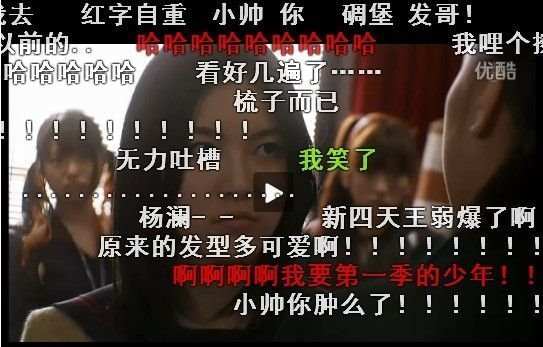你爱看“弹幕”视频吗? <img src="/data/attachement/jpg/site1/20160113/00221910993f17ffe4bd0d.jpg" border="0" />
中国日报网 2016-01-13 08:50

如今,各个视频网站在播放器菜单中都会显示“弹幕”这个功能,身边也有不少朋友专门喜欢开着“弹幕”看视频,说那样看着热闹,感觉不是自己一个人在看。去年,有部分电影院还试着推行了影片放映时观众可以发送“弹幕”。不知道试行效果如何呢?

“Bullet screen,” or danmu, a model of movie-watching that has been introduced in select theaters in China since 2014 has been widely used by video websites.
2014年开始在中国部分指定影院引入的“弹幕”其实早已被在线视频网站广泛应用了。
In this case, the bullets don’t refer to actual bullets, but to text messages that audience members send via their mobile phones while watching the film or video. The messages are then projected onto the screen, so that at any given time the scene may be overlaid with multiple “bullets,” or comments, scrolling across the screen.
这里的“弹”并不是真正的子弹,而是指观众在看电影或视频时通过手机发送出去的信息。这些信息发送之后都被直接显示在屏幕上,所以,观看电影或视频的时候,你随时都可能看到整个屏幕上挂满了滚动显示的“子弹”,也就是评论。
The idea behind “bullet screens” originated in Japan, where they were first popularized by a Japanese ACG (animation, comics, games) video portal called Nicodou, which later became the inspiration for similar Chinese ACG video sites such as Bilibili.
“弹幕”这个概念来源于日本,由一个名叫Nicodou的动漫游戏视频网站普及开来,后来也催生了中国类似Bilibili的网站。
While comments can be so numerous that they obscure the entire screen, many “bullet screen” proponents say the point is often not to watch the actual video in any case, but to get together and “tucao,” Chinese for “spit and joke around,” about the silliness of the video.
有时候,弹幕评论太多,会使得整个视频屏幕难以看清,不过,很多“弹幕”拥趸都表示,他们真正的乐趣并不在于看视频,而在于一起吐槽这个视频有多二。
(中国日报网英语点津 Helen)

















 英语点津微信
英语点津微信 双语小程序
双语小程序